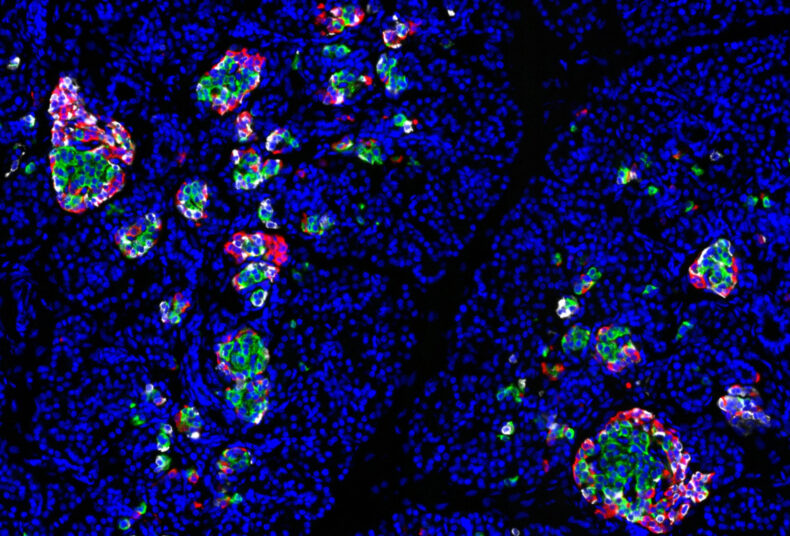Leading investigators in diabetes, pancreas and islet biology, and computational biology have received $12.5 million in two five-year awards from the National Institutes of Health (NIH) to create the world’s first, integrated knowledge base of human-derived tissue- and cellular-level pancreatic information to support innovative, collaborative and reproducible research.
With growing data obtained through single cell/spatial sequencing and complex imaging technologies, several pancreas and islet phenotyping efforts in the United States and Europe are generating high-quality, multimodal datasets.
However, because that information is housed across many different resources and processed in different ways, it is challenging for investigators to discover or re-use, especially if they do not have training in computational biology.
The creation of the Pancreas KnowledgeBase (PanKbase) program will play a key role in organizing, standardizing and disseminating data and resources focused on the human pancreas.
Curated data derived across multiple modalities spanning human genetics, genomics, human islet physiology, spatial pancreatic tissue architecture and more will be available in PanKbase, following the FAIR Data Principles of findability, accessibility, interoperability and reusability. FAIR principles emphasize machine-actionability or the capacity of computational systems to find, access and reuse data with little human intervention.
The interdisciplinary PanKbase teams, one with researchers from University of Michigan, Vanderbilt University, Vanderbilt University Medical Center, Weill Cornell Medicine and the Jackson Laboratory for Genomic Medicine, and a second comprised of researchers from University of California San Diego, Stanford University, the University of Pennsylvania and the Broad Institute, together with active participation of the NIH National Institute of Diabetes and Digestive and Kidney Diseases (NIDDK) program officers, will bring extensive expertise in developing resources and knowledge portals related to the pancreas and diabetes, including:
- Common Metabolic Diseases Knowledge Portal (CMDKP), an open access data and software platform established in 2015 to interrogate the genetic basis of complex disease developed at the Broad Institute, which together with CMDGA is part of the Accelerating Medicines Partnership in Common Metabolic Diseases consortium of academic, industry and nonprofit institutions.
- Common Metabolic Diseases Genome Atlas (CMDGA), an online database of standardized genomic data from key tissues related to metabolic disease developed at the University of California San Diego.
- Pancreatlas, the world’s first online imaging database of human pancreatic tissue developed by a Vanderbilt University Medical Center and Vanderbilt University team in 2020.
- Genomic Knowledgebase (GenomicKB) platform, an online database developed by University of Michigan researchers that uses a knowledge graph to consolidate genomic datasets and annotations from more than 30 research consortia.
- The Common Fund Knowledge Center (CFKC): a program started in 2023 that will create a knowledge network to integrate knowledge generated by Common Fund programs.
PanKbase will also have an open science component to support the generation of new insights into molecular signatures of Type 1 diabetes (T1D) and facilitate cross-organ analysis for different stages of T1D development. This approach will lay a foundation allowing the inclusion of other common and rare forms of diabetes in the PanKbase resource.
The PanKbase program will become a component of the Human Islet Research Network (HIRN), adding to the network’s existing research resources: the Human Islet Research Enhancement Center (HIREC) and the Human Pancreas Analysis Program (HPAP).
The PanKbase teams include Stephen Parker, PhD, and Jie Liu, PhD, from University of Michigan; Jean-Philippe Cartailler, PhD, from Vanderbilt University; Marcela Brissova, PhD, and Diane Saunders, PhD, from Vanderbilt University Medical Center; Shuibing Chen, PhD, from Weill Cornell Medicine; Michael Stitzel, PhD, from The Jackson Laboratory for Genomic Medicine; Kyle Gaulton, PhD, from the University of California San Diego; Anna Gloyn, DPhil., of Stanford University; Ben Voight, PhD, from University of Pennsylvania, Noël Burtt, PhD, and Jason Flannick, PhD, of the Broad Institute, and Xujing Wang, PhD, and Ashley Xia, MD, PhD, of the NIH National Institute of Diabetes and Digestive and Kidney Diseases.
The project is supported by National Institutes of Health grants U24 DK138515 and U24 DK138512.













